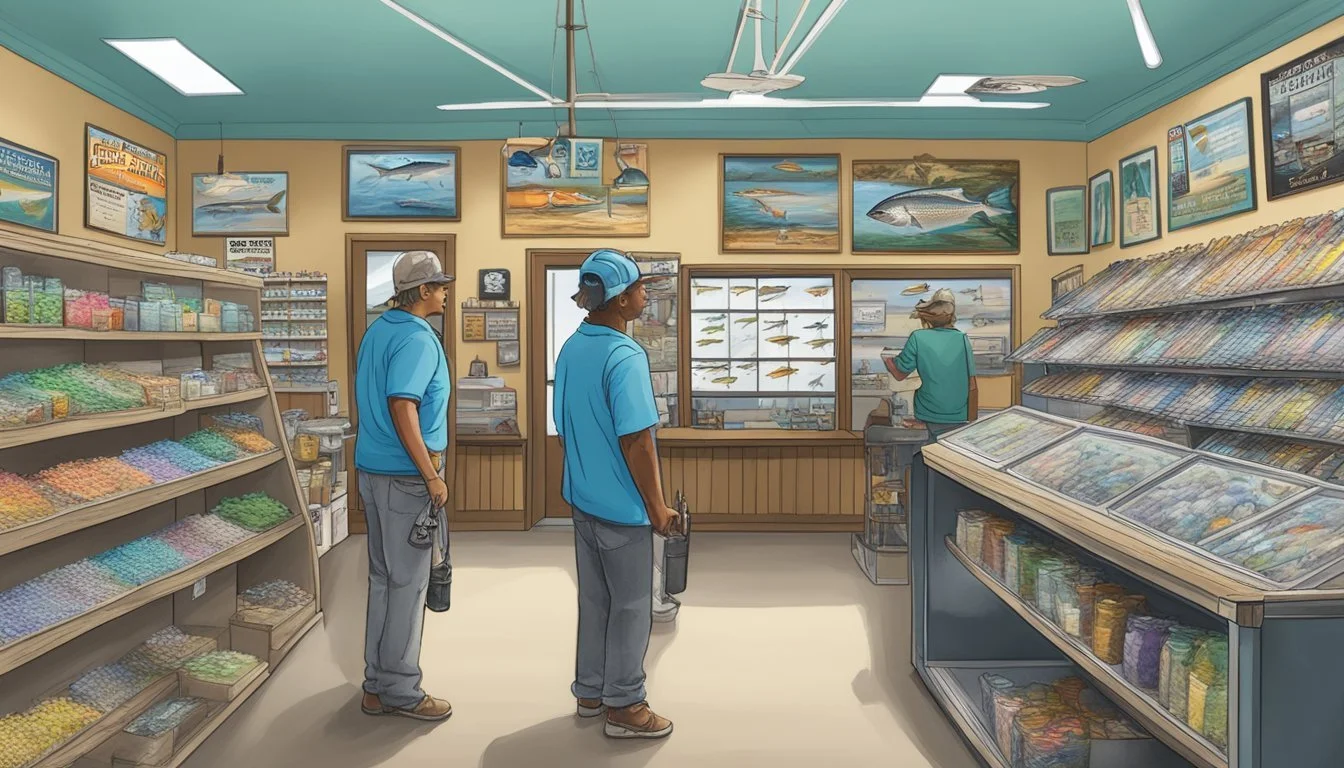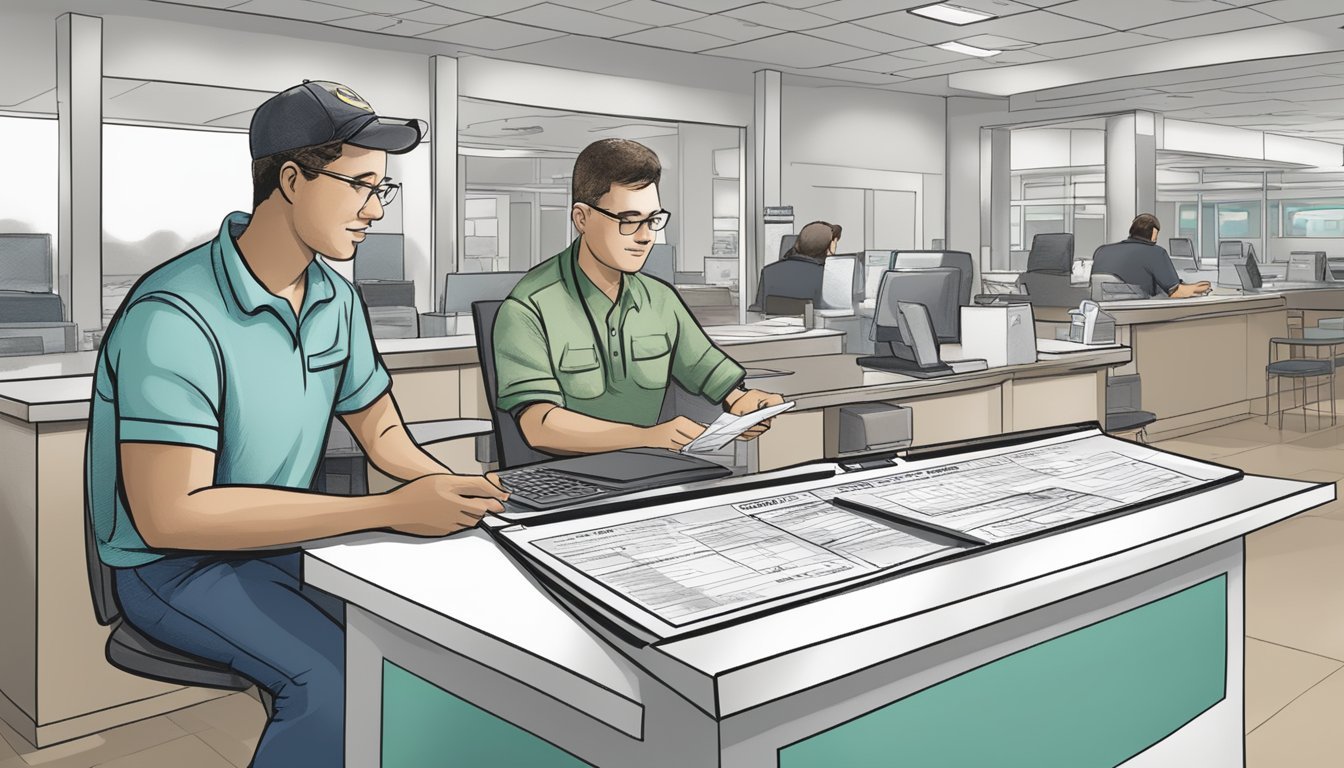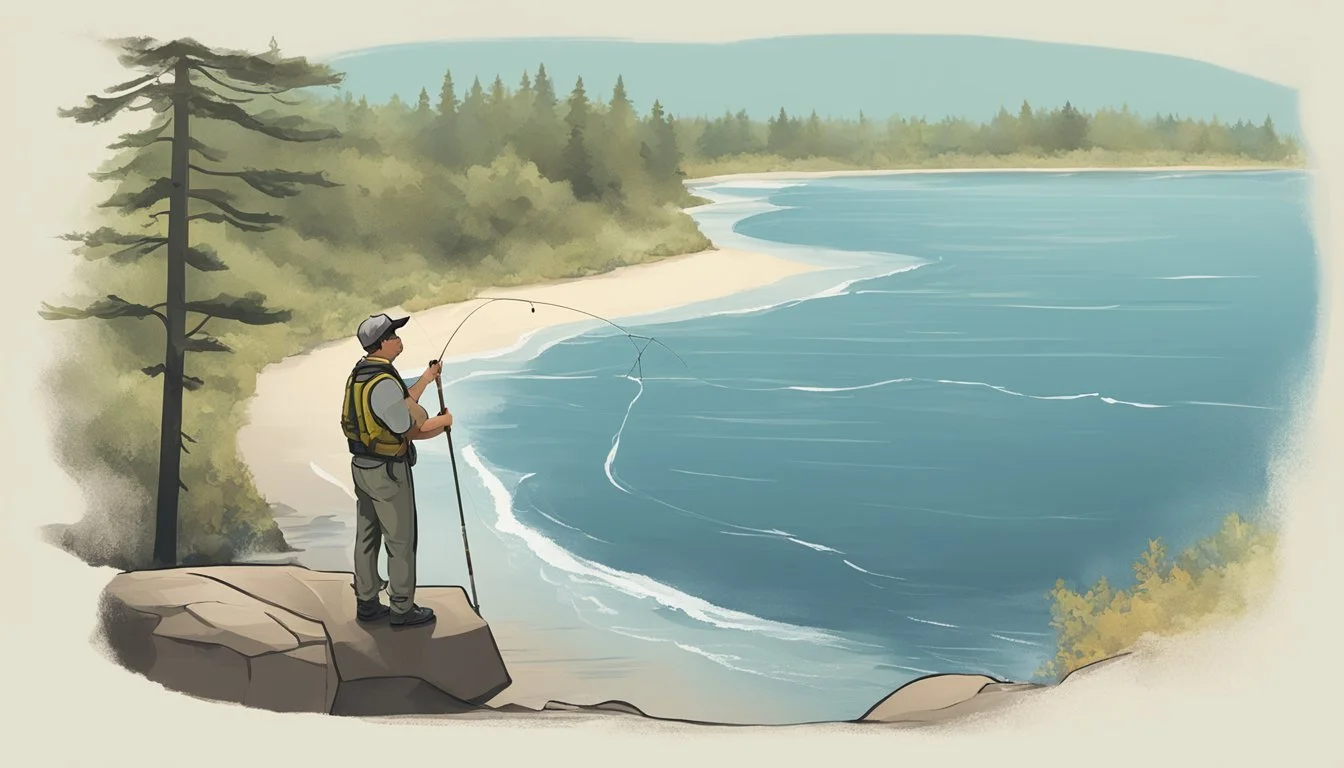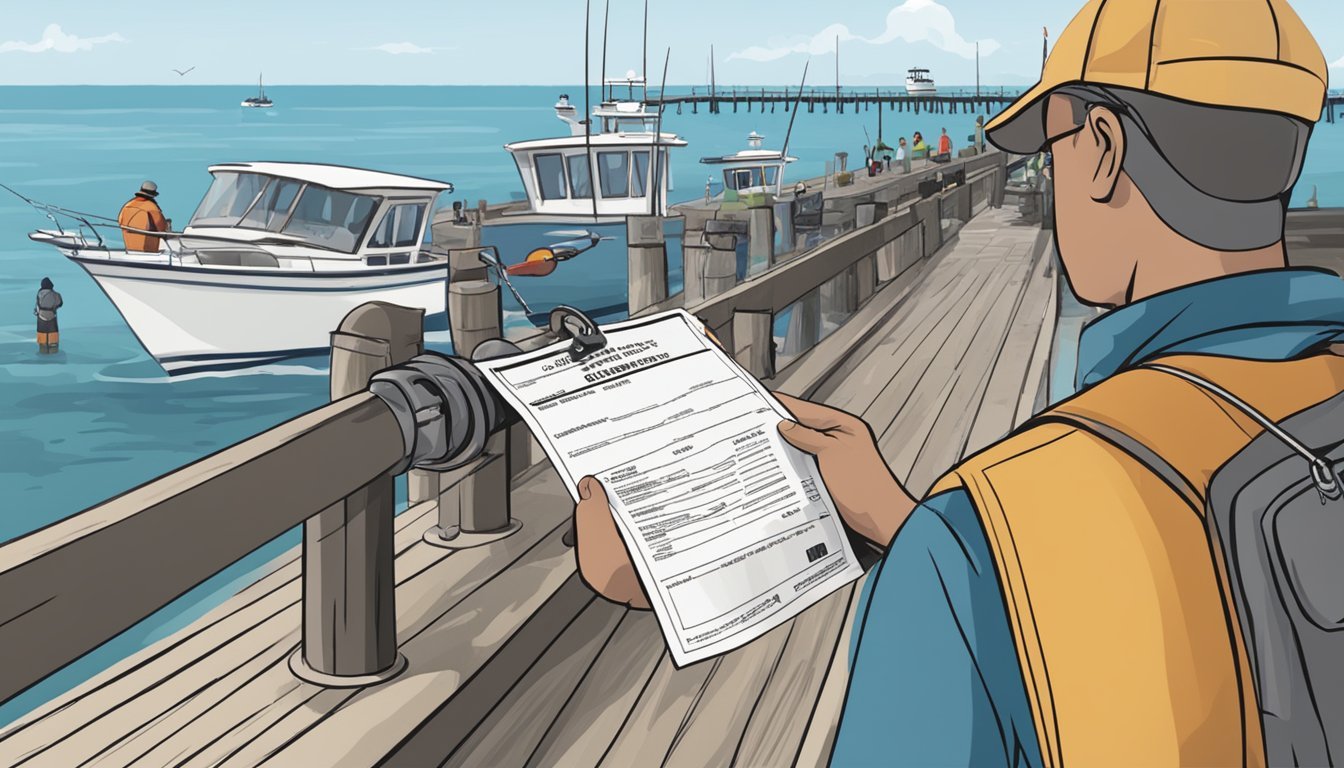How to Get a Georgia Saltwater Fishing License
Your Essential Guide
Anglers looking to engage in saltwater fishing in the state of Georgia must acquire an appropriate fishing license. The requirements serve not only as a regulatory measure but also aid in the conservation and management of the state's aquatic resources. Obtaining a saltwater fishing license is a straightforward process that can be completed either online, in person at a local agent, or by phone. For fishing in saltwater areas, it is mandatory to have a basic fishing license and a free Saltwater Information Permit (SIP), which is valid for 365 days from the date of issue.
The state of Georgia has specific provisions for various types of fishing licenses based on residency status, age, and the activities one wishes to pursue. Before heading to the coastal waters, anglers must ensure that they are properly equipped with the required documents. The SIP, obtainable through the same channels as the basic license, is an additional requirement for saltwater anglers who will fish (What wine goes well with fish?) beyond 3 miles offshore in the Atlantic Ocean. This permit ensures that local fishers are exempt from the federal requirement to have a National Saltwater Angler Registry permit.
While the process of acquiring the license and permit has been made user-friendly through services like GoOutdoorsGeorgia.com and the Go Outdoors Georgia App, prospective fishers also have access to support via phone through the Department of Natural Resources Division. They provide ample resources, including a dedicated helpline, for any questions or assistance needed during the application process. This systematic approach ensures that both new and experienced fishers comply with state regulations and can enjoy their fishing activities responsibly.
Understanding Georgia's Fishing License Requirements
In Georgia, saltwater anglers must adhere to specific licensing rules to fish legally. This ensures the conservation of the state's aquatic resources and supports recreational opportunities.
Types of Fishing Licenses
Georgia offers annual and short-term licenses for fishing, catering to the diverse needs of anglers. An individual can choose from a 1-Day, Additional Day, or an Annual Fishing License. Special permits like the SIP (Saltwater Information Program) permit are required for saltwater fishing. Georgia also provides a Lifetime Sportsman's License, which includes saltwater fishing privileges.
Eligibility Criteria for Residents and Non-Residents
To qualify for a resident fishing license, one must have lived in Georgia for at least three consecutive months. Non-residents are also eligible to fish in Georgia waters but must purchase a non-resident license.
Age Requirements and Exemptions
Georgia law requires anyone 16 years and older to have a valid fishing license. Youth under 16 do not need a license to fish. Seniors may qualify for discounts, and there are exemptions for some resident seniors on fishing licenses.
Combination Hunting and Fishing License Options
Anglers who also enjoy hunting can opt for a combination license. This license offers both fishing and hunting privileges, available in annual formats. For avid sportsmen, a Lifetime Sportsman's License is a cost-effective choice, granting lifelong hunting and fishing rights in both freshwater and saltwater environments.
Detailed Guide to Saltwater Fishing License
Procuring a saltwater fishing license in Georgia is straightforward when one understands the necessary registrations and permits. The following subsections explain the Saltwater Angler Registration, the SIP Permit requirements, any additional endorsements required, and information pertaining to lifetime and disability licenses.
Saltwater Angler Registration
To fish in Georgia's saltwater areas, one must register as a Saltwater Angler. This is vital to ensure compliance with state regulations and to assist in the conservation of marine resources. Registration can be easily completed online via the Georgia Department of Natural Resources (DNR) website or at an authorized licensing agent.
SIP Permit Necessities
SIP Permit, short for Saltwater Information Program Permit, is a must-have for those who fish in the Atlantic Ocean beyond 3 miles offshore. Although anglers with a valid fishing license are exempt from the National Saltwater Angler Registry permit within this area, they are still required to obtain a SIP Permit. This permit is complimentary with a saltwater fishing license and can be acquired simultaneously.
Additional Saltwater License Endorsements
In addition to the basic saltwater fishing license, certain species such as trout may require an additional endorsement. It is important to check the latest regulations for any specific endorsements needed to legally target and catch these species. All endorsements can be added to one's saltwater fishing license during the application process.
Lifetime and Disability License Information
Georgia offers lifetime licenses for anglers, which eliminate the need for annual renewals. These are available for both residents and non-residents. Furthermore, individuals with disabilities have the option to apply for a disability license, which may offer additional benefits in alignment with state provisions. Detailed information about these licenses, including eligibility criteria and application procedures, can be found on the Georgia DNR website.
Having the appropriate license and understanding the regulations ensure responsible and lawful angling within Georgia's marine waters.
The Purchase Process
In Georgia, acquiring a saltwater fishing license is a straightforward process that can be completed through various channels. Anglers can utilize the online licensing system, visit a licensed agent, or use the Go Outdoors Georgia App to obtain or renew their fishing licenses.
Online Licensing System
Prospective anglers can purchase or renew their licenses via the Go Outdoors Georgia website at gooutdoorsgeorgia.com. The online portal provides a hassle-free way to acquire a saltwater fishing license, available to both residents and non-residents of Georgia. After completing the necessary forms and payment, the license is issued electronically.
Visiting a License Agent
For those who prefer in-person transactions, Georgia offers numerous locations where licenses can be purchased. Local agents, such as sporting goods stores or tackle shops, can provide licenses and permits. Agents are equipped to assist customers with their licensing needs, ensuring a smooth transaction.
Using the Go Outdoors Georgia App
Anglers on the go may download the Go Outdoors Georgia App on their smartphone. This application allows users to quickly purchase or renew their licenses, access fishing regulations, and store electronic copies of their licenses. The app is a convenient tool for anglers to stay legal and informed while fishing Georgia’s saltwater areas.
Regulations and Resources
In Georgia, the Department of Natural Resources (DNR) is the main authority overseeing fishing licenses and conservation efforts. The regulations set forth by the DNR's Wildlife Resources Division are designed to sustain fish populations and ensure a balanced ecosystem.
Freshwater Versus Saltwater Regulations
Georgia has distinct regulations for freshwater and saltwater fishing to cater to the differing environments and species present. Fishing licenses are mandatory for anglers age 16 and older, with specific regulations applying to saltwater areas. Anglers must obtain a free Saltwater Information Program (SIP) Permit alongside their standard fishing license to fish in Georgia's saltwaters. This dual licensing helps address the distinct conservation needs of freshwater and saltwater fisheries, ensuring resource management tailored to each habitat.
Size and Bag Limits
The DNR establishes size and bag limits for various species to promote sustainable fishing practices. These regulations dictate the number of fish (bag limits) an individual may keep in a day and the legal dimensions (size limits) fish must meet to be retained. Such regulations are part of a comprehensive fisheries management approach, relying on data collection and studies to determine appropriate thresholds that prevent overfishing and support fisheries management.
Protected Species and Conservation Efforts
Conservation efforts by the Wildlife Resources Division involve identifying and protecting species that are vulnerable or at risk. Regulations may include seasonal fishing closures, gear restrictions, and area-specific rules to safeguard these species. Additionally, the DNR conducts research and data collection to inform resource management and maintain ecosystem health. Trout and other species may have specific regulations that exemplify the DNR's commitment to conservation and the strategic management of Georgia's wildlife resources.
Additional Permits and Privileges
Apart from the basic Georgia saltwater fishing license, anglers may require additional permits and privileges based on their specific activities. These may include permits for hunting big game, mountain trout stamps, as well as considerations for migratory bird hunting.
Big Game Permits
Individuals seeking to hunt big game species such as deer, bear, or turkey in Georgia's Wildlife Management Areas (WMAs), Public Fishing Areas (PFAs), and other state-managed lands must obtain a separate Big Game Permit. This requirement applies in addition to their standard hunting license.
Mountain Trout Stamps
Anglers aiming to fish for mountain trout in Georgia’s designated trout waters must ensure to obtain a Mountain Trout Stamp. This stamp must accompany their fishing license and is crucial for those seeking access to the state-managed trout streams and lakes.
Migratory Bird Hunting Considerations
When targeting migratory bird species, including ducks and doves, hunters must observe additional federal requirements. They are required to have a Georgia Migratory Bird Stamp and may also need to comply with the Federal Duck Stamp. These stamps fund conservation efforts and are mandatory for migratory bird hunting activities.
Access to Fishing Locations
Holding a Georgia saltwater fishing license grants the angler entry to a variety of fishing locations. These locations cater to different types of fishing experiences, from serene coastal spots to bustling public areas teeming with wildlife.
State Properties Access
State Properties in Georgia provide anglers with more than just fishing opportunities; they are a gateway to a myriad of recreational activities. With a valid sportsman's license or a lands pass, individuals gain access to these properties, which include scenic coastal Georgia regions ideal for saltwater fishing. By obtaining a basic hunting or fishing license, access is also granted to:
Hiking Trails
Birdwatching Spots
Wildlife Management Areas and Public Fishing Areas
Georgia boasts a network of Wildlife Management Areas (WMAs) and Public Fishing Areas (PFAs), offering diverse fishing environments. The WMAs are known for their well-managed habitats that support a wide range of wildlife, while PFAs are specifically designed to provide excellent freshwater and saltwater fishing conditions. These areas are maintained by fishing license funds, ensuring their quality and sustainability. The key points about these areas include:
WMAs and PFAs are accessible to license holders.
They contribute to the conservation of Georgia's aquatic resources.
Some PFAs might be located within easy reach of the Atlantic Ocean, enhancing the fishing experience.
Special Licenses and Considerations
When acquiring a Georgia saltwater fishing license, individuals must be aware of specific categories that might affect their licensing needs, such as options for veterans, seniors, people with disabilities, and landowners. Understanding these details ensures compliance with state regulations and may provide eligibility for certain privileges or discounts.
Sportsman’s Licenses for Veterans
Georgia honors its veterans by offering a Sportsman's License at a reduced cost. This license is available to resident veterans who have proof of residency and certain service-related criteria. The Georgia Department of Natural Resources requires documentation of residency and a service connection to process this application.
Discounts for Seniors and People with Disabilities
Seniors over the age of 65 and people with disabilities are eligible for discounts on their fishing licenses. A resident fishing license for such individuals may come with considerable concessions, ensuring that everyone has the opportunity to enjoy fishing in Georgia's waters. They must provide proper identification and, if applicable, disability documentation to qualify.
Landowner Permissions and Regulations
Landowners in Georgia who wish to fish in saltwater must adhere to state regulations that may exempt them from the requirement of possessing a standard fishing license on their own property. However, when fishing off their property, a valid license is necessary. Landowners should direct inquiries to the Georgia Department of Natural Resources for specific regulations.
Maintaining License Validity
Georgia saltwater anglers are responsible for ensuring that their licenses remain valid at all times. This involves timely renewals and immediate replacements when required.
Licensing Renewals and Replacements
When a Georgia saltwater fishing license approaches its expiration date, anglers must renew it to maintain legality on the waters. Renewals can be processed online, in person at a designated agent, or by calling the support number. Conveniently, for smartphone users, renewals can also be done through the Go Outdoors Georgia App.
In case of loss or damage to the license, a replacement is necessary to continue fishing legally. This can be done by re-printing the license through the official website or via the app. Keeping contact information up-to-date is crucial for receiving renewal notifications and important updates from the Department of Natural Resources.
Hunter Education and Requirements
For individuals interested not only in fishing but also in hunting or trapping, Georgia requires completion of a hunter education course. This applies to hunters born on or after January 1, 1961, and covers ethical hunting practices, wildlife management, and safety.
Anglers and hunters need to be aware that separate permits or stamps may be required for certain game species. It's essential to check the current regulations and secure any additional permissions before setting out.
Support and Assistance
Obtaining a Georgia saltwater fishing license involves a clear process; however, individuals may need support along the way. The Georgia Department of Natural Resources (DNR) provides resources to assist with questions and transaction processes.
Contacting the Georgia DNR for Help
For personalized assistance, the Georgia DNR's Wildlife Resources Division is the primary contact. Contact information is readily available for those needing help with their fishing license. Individuals can reach out via email or by phone at the following:
Email: [Email Protected]
Help Desk Support: 855-502-6358
License agents throughout the state can also provide support for license transactions and inquiries.
Navigating Frequently Asked Questions
The Georgia DNR website offers a comprehensive section of frequently asked questions (FAQs) which cover a wide array of topics related to saltwater fishing licenses. This resource can help clarify common concerns and procedural questions, thereby reducing the need for direct contact.
Transaction Fees and Payment Methods
When purchasing a license or permits, individuals will encounter transaction fees. The fees are minimal and contribute to the conservation efforts in Georgia. Payment methods are versatile, accepting major credit cards and in some cases, checks or cash when transacting in person with a license agent. The following table outlines the transaction fees:
Transaction Type Fee Online Purchase $2.50 In-person Purchase $3.00 Phone Purchase $4.00
It's important for applicants to budget for these additional costs when planning to acquire their saltwater fishing license.
Out-of-State and International Anglers
Anglers visiting Georgia from other states or countries have specific requirements to fulfill before they can enjoy saltwater fishing. These regulations ensure the preservation of marine life while providing a consistent fishing experience across state lines.
Reciprocal Agreements with Neighboring States
Georgia honors reciprocal agreements with adjacent coastal states—Florida, South Carolina, and North Carolina. Out-of-state anglers from these states can fish in Georgia's saltwater areas without obtaining a separate Georgia license, provided they have a valid recreational fishing license from their home state. It's imperative for non-residents to verify the extent of these agreements, as they may vary or be subject to change.
National Saltwater Angler Registration
Non-residents who plan to fish in federal waters beyond 3 miles offshore are normally required to register with the National Saltwater Angler Registry. However, those who have a valid fishing license along with a Georgia Saltwater Information Program (SIP) Permit are exempt from this federal requirement. The SIP Permit is essential for saltwater anglers in Georgia and can be easily obtained alongside the state fishing license. International anglers, as well as non-residents who lack affiliation with the reciprocal states mentioned, must ensure compliance with both the Georgia-specific and federal fishing regulations.
Advanced Fishing Topics
When considering advanced fishing topics in Georgia's saltwater regions, anglers must navigate a complex set of regulations, particularly when engaging in commercial activities or targeting specific species such as tarpon and sharks. These subsections provide focused information on obtaining the necessary licenses and understanding the pertinent regulations.
Commercial Fishing Licenses and Regulations
Commercial fishing in Georgia's saltwater areas necessitates a Commercial Fishing License, which is strictly regulated to maintain sustainable fish populations and ecosystems. Prospective commercial fishers must apply through the Georgia Department of Natural Resources (DNR), ensuring they meet all eligibility requirements.
Eligibility: Applicant must prove residency or have a business in Georgia.
Documentation: A valid ID and proof of residency/business operation location.
Fees: Vary based on the type of commercial activity and gear used.
Renewal: Annual basis with considerations for regulatory changes each year.
Regulations encompass gear restrictions, catch limits, and seasonal considerations, all designed to balance economic opportunities with resource conservation.
Targeting Specific Species like Tarpon and Sharks
Anglers aiming to catch particular species such as tarpon and sharks are subject to specific regulations to protect these potentially vulnerable species.
Tarpon:
License Requirement: Mandatory to carry a Georgia fishing license and a free Saltwater Information Program (SIP) permit.
Catch and Release: Highly encouraged practice to ensure tarpon conservation.
Tackle Restrictions: Use of non-stainless steel hooks and non-offset circle hooks are encouraged to minimize harm.
Sharks:
Additional Permits: Some species may require additional permits given their protected status.
Size and Bag Limits: Enforced to support shark population sustainability.
Species Restrictions: Certain species of sharks may be completely off-limits to fishing due to their conservation status.
Anglers must stay informed about the latest regulations from the DNR, as these can change based on ongoing conservation research and ecosystem status.
License Management for the Future
Managing fishing licenses plays a pivotal role in safeguarding Georgia's aquatic resources for future generations and ensuring sustainable fishing practices. The Georgia Department of Natural Resources employs modern technology to simplify the process and enhance the effectiveness of conservation efforts.
The Role of Licenses in Conservation and Resource Management
Licenses are not just legal requirements; they are crucial tools in conservation. They help regulate the number of anglers, monitor fish populations, and impose necessary restrictions to prevent overfishing. In Georgia, obtaining a fishing license requires a social security number and, if applicable, a Georgia driver’s license. These identifiers aid in the enforcement of regulations and help ensure that both residents and nonresidents comply with state laws. For those in active duty, special considerations apply when purchasing a fishing license. Georgia also offers a lifetime license, which is an investment into the state's natural resource management strategies, securing funds for maintaining a healthy aquatic ecosystem.
Technology Integration: Online and Smartphone Applications
The integration of technology into license management is key to modern conservation. In Georgia, anglers can purchase licenses online or via a smartphone app. This convenience encourages compliance and provides an easy interface for the public.
Online License Purchase:
User-friendly website
Secure transactions
Immediate issuance of licenses
Smartphone App:
Quick access for license purchases
Digital storage of license information
Real-time updates on regulations
By providing these digital solutions, Georgia ensures that even in a world where technology is ever-changing, their resource management remains resilient and adaptable.
Georgia Fishing Identity and Culture
Georgia's saltwater fishing community is anchored in a tradition of recreation and stewardship. They demonstrate a commitment to the outdoors through active participation in programs like the Saltwater Information Program (SIP) Permit, which aids in resource management and ensures a sustainable fishing culture.
Understanding the Angler Community
Georgia's angler community is diverse, consisting of seasoned fishermen, enthusiastic beginners, and tourists. They are united by a passion for saltwater fishing along Georgia's extensive coastline, sharing knowledge and experiences through various platforms, including the Outdoors Georgia app. This digital tool not only facilitates the purchase of fishing licenses but also serves as a bridge, connecting anglers with important updates and communal activities.
Promoting Responsible Fishing Practices
Responsible fishing practices are deeply ingrained in the ethos of Georgia's fishing community. The SIP Permit is more than a regulatory requirement; it represents the anglers' dedication to sustaining their marine environment. By obtaining this permit, they contribute to:
Effective resource management strategies
Collection of data vital for maintaining fish populations
Educational efforts promoting ethical angling behaviors
Fishermen in Georgia recognize that their actions have a direct impact on the future of coastal fisheries. Thus, they proactively engage in practices that support ecosystem health and ensure the longevity of the state's fishing heritage.











